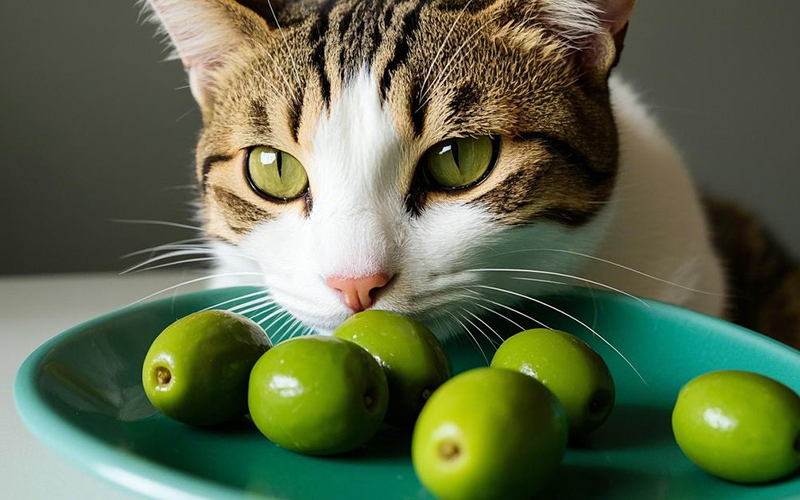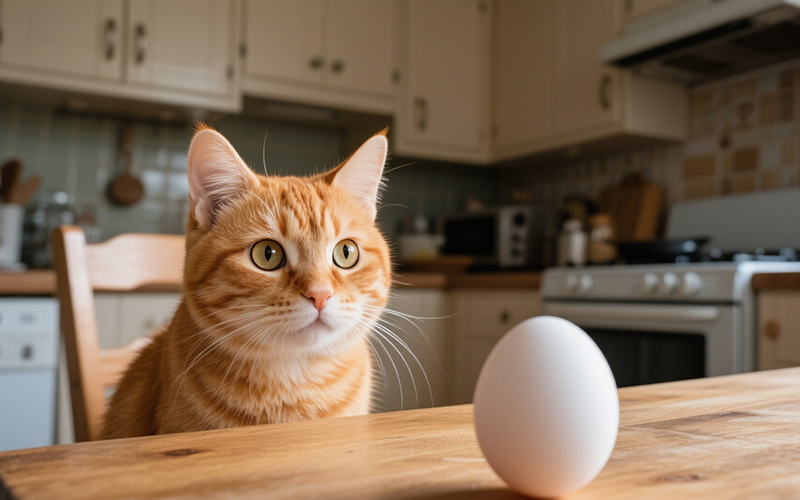Can Cats Eat Green Olives? Are They Safe or Harmful?
- 5 Mar 2025 10:10
If you’ve ever noticed your cat sniffing or playing with a green olive, you might wonder, “Can cats eat green olives?” The answer is yes, in small amounts, green olives are not toxic to cats, but they are not the best snack for your feline friend.
In this guide, we’ll explore:
✅ Why cats are attracted to green olives
🚫 Potential risks of feeding olives to cats
🐾 Safe ways to offer olives (if at all)

Why Are Cats Attracted to Green Olives?
Some cats love the smell of green olives because they contain compounds similar to nepetalactone, the active ingredient in catnip. This can cause some cats to act playful, excited, or even a little loopy when they smell olives!
But just because your cat is interested doesn’t mean olives are a healthy treat.
Are Green Olives Safe for Cats?
Green olives are not toxic to cats, but there are a few concerns to keep in mind:
⚠️ High Sodium Content
Store-bought olives are often brined in salt, which can be dangerous for cats.
Too much sodium can cause dehydration, high blood pressure, or even poisoning.
⚠️ Added Ingredients
Many olives come stuffed with garlic, onions, or peppers, which are toxic to cats.
Flavored olives with vinegar or oil can upset a cat’s stomach.
⚠️ Digestive Issues
While one small, plain olive won’t harm your cat, too many may cause diarrhea, vomiting, or stomach discomfort.
⚠️ Choking Hazard
Olive pits can be a choking hazard and may cause intestinal blockages if swallowed.
Always remove the pit before giving an olive to your cat.
How to Safely Offer Green Olives to Cats
If your cat is obsessed with olives, you can offer them a tiny piece occasionally. Follow these steps:
✔ Choose plain, unsalted green olives (no brine, oil, or seasonings).
✔ Remove the pit to avoid choking hazards.
✔ Give a tiny amount—one small piece is enough.
✔ Watch for digestive issues like vomiting or diarrhea.
📌 Tip: Instead of olives, consider giving your cat catnip or cat-friendly treats to satisfy their cravings safely.
Frequently Asked Questions
❓ Can cats eat black olives?
✅ Yes, in small amounts, but they have no real nutritional benefits for cats.
❓ Are olives toxic to cats?
🚫 No, plain olives are not toxic, but the salt, seasonings, and pits can be harmful.
❓ Why does my cat act crazy around olives?
😺 Some cats react to olives like catnip because of the similar compounds found in both.
Final Verdict: Can Cats Eat Green Olives?
✅ Yes, but only in very small amounts and without salt, brine, or pits.
🚫 Too much sodium, seasonings, or pits can be dangerous.
💡 Want expert pet nutrition advice? Try PettureX, the 24/7 AI pet assistant, for instant answers on safe foods for your cat!
Would you like suggestions for healthy cat treats? Let me know! 🐱🫒
Related

Can Cats Eat Egg Yolk Raw? A Vet's In-Depth Guide to Feline Nutrition & Safety
- 10 Jun 2025
Can Cats Eat Dog Kibble? Unpacking the Nutritional Mismatch!
- 29 May 2025
Can Cats Eat Deli Turkey? Slicing Through the Facts for Your Feline!
- 29 May 2025
Can Cats Eat Deer Meat? Exploring Venison for Your Feline!
- 28 May 2025
Can Cats Eat Corned Beef? Unpacking This Salty Human Delicacy!
- 28 May 2025
Can Cats Eat Cooked Rice? The Grain Truth for Your Feline Friend!
- 27 May 2025
Can Cats Eat Cornbread? A Crumb of Truth for Curious Cat Owners!
- 27 May 2025
Can Cats Eat Cooked Meat? Sizzling Facts for Your Feline's Feast!
- 26 May 2025
Can Cats Eat Chili? Spicing Up the Truth About This Human Dish!
- 26 May 2025
Can Cats Eat Chicken Eggs? Cracking the Code on This Feline Food Query!
- 24 May 2025
